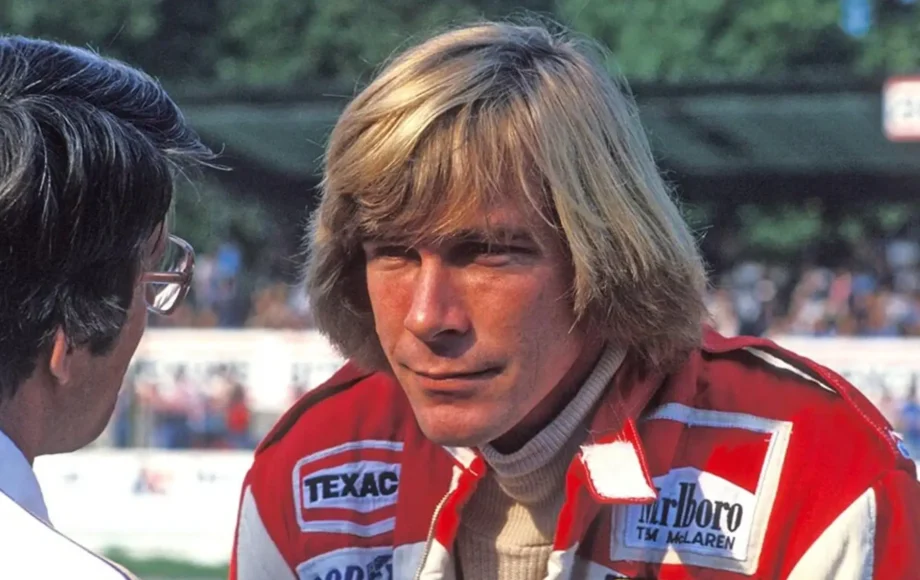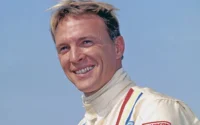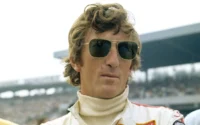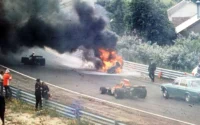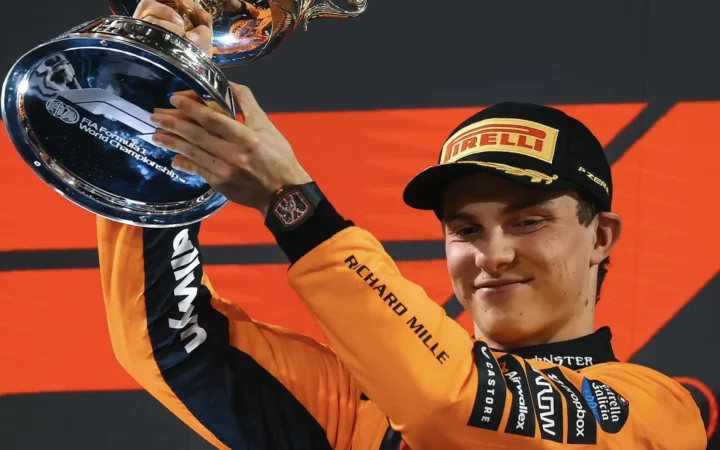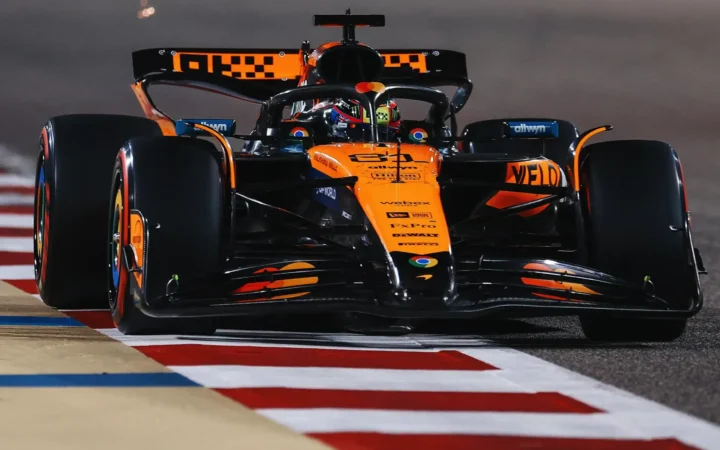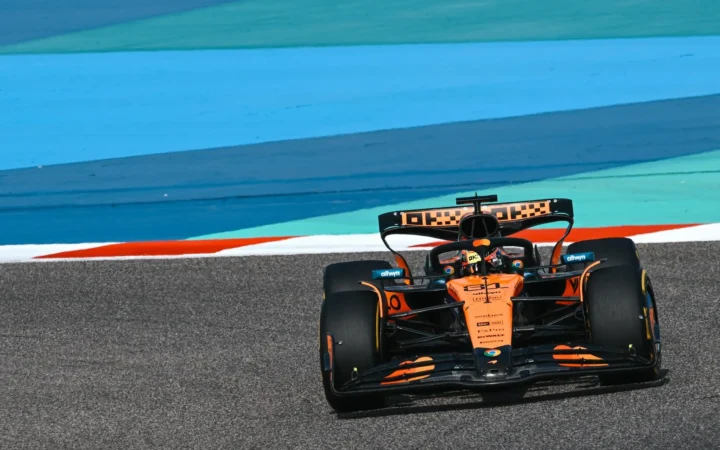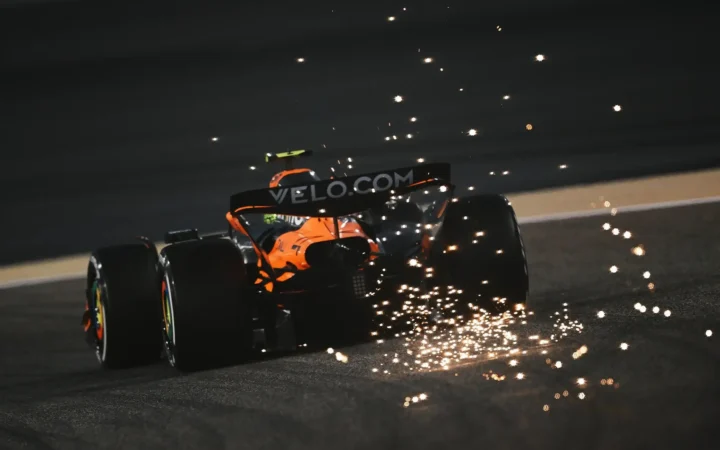What happened on this day, August 29 in Formula 1 history? Find out interesting facts and stories about Formula 1 on this day.
1947
The 1976 F1 World Champion, James Hunt, was born on this day 29 August 1947. Hunt lived a stormy life, pushing boundaries both on and off the racetrack. As a driver, he conquered constant fear and overwhelming odds to become the world’s best, winning one of the most dramatic championship battles in Formula One history. Known for his colourful personality and unconventional character, Hunt entertained admirers and offended critics with his sometimes outrageous behaviour.
Niki Lauda was his closest friend among the drivers, with whom he had a thrilling battle for the 1976 Championship, was leading the standings that season until a near-fatal accident at the Nurburgring. James won that race and five others, leading to a final showdown with the miraculously recovered Lauda in Japan. Lauda deemed the race too dangerous due to the wet conditions and retired after a few laps, while Hunt drove furiously to finish third and become World Champion. Post-retirement, Hunt made a significant impact as a TV commentator but tragically died in his prime on 15 June 1993 aged 45.
1976
On his 29th birthday, British driver James Hunt raced a McLaren M23 to victory at the 1976 Dutch Grand Prix. Clay Regazzoni in a Ferrari took second, and Lotus driver Mario Andretti completed the podium in third. Tragically, the weekend was overshadowed by the death of track marshal Ron Lenderink, who was also 29, during a touring car support race.
1982
Despite not being held in Switzerland, the 1982 Swiss Grand Prix took place at Dijon-Prenois in France on 29 August. Keke Rosberg won the race in a Williams, with Alain Prost, who started from pole position, finishing second in a Renault, while Niki Lauda took third place in a McLaren. This victory marked Rosberg’s only win of the 1982 season, despite him becoming the World Champion that year. In a comical error, the chequered flag was mistakenly shown after 81 laps, as the organisers missed the leading car on the 80th lap.
This race was significant as it marked the first Swiss Grand Prix to be part of the World Championship since 1954, even though it was not held in Switzerland, where motor racing had been banned following the 1955 Le Mans disaster.
1993
British driver Damon Hill, racing for Williams, secured victory at the 1993 Belgian Grand Prix, while his French teammate Alain Prost, who started from pole position, led the first 30 laps. However, Prost fell to third place after a slow pit stop, allowing Hill and Benetton driver Michael Schumacher to overtake him. Hill ultimately won the race by 3.6 seconds ahead of Schumacher, with Prost finishing 11 seconds further back. This 1-3 finish clinched Williams their second consecutive Constructors’ Championship.
1999
McLaren driver David Coulthard started from second position at the 1999 Belgian Grand Prix but quickly took the lead by overtaking his Finnish teammate Mika Hakkinen, who had secured pole position, at the first corner. Coulthard maintained his lead for all 44 laps, ultimately winning the race. Hakkinen finished in second place, about 10 seconds behind, while German driver Heinz-Harald Frentzen secured third place for Jordan. Frentzen’s teammate and 1996 World Champion Damon Hill scored his last points in F1 at this race, finishing sixth.
2004
Kimi Raikkonen won the 2004 Belgian Grand Prix, securing his and McLaren’s only win of the 2004 season after starting from tenth on the grid. Michael Schumacher finished in second place for Ferrari, enough to secure his seventh and final World Championship, with teammate Rubens Barrichello taking third.
Jarno Trulli started from pole position for Renualt alongside Schumacher, and the race featured numerous lead changes. However, after several well-timed safety car periods, Raikkonen emerged in the lead for the final laps. At the start, Mark Webber in a Jaguar triggered a pile-up that eliminated four cars and damaged several others, for which he later admitted fault. Webber’s teammate, Christian Klien, also secured his first championship points by finishing sixth, but they would be the last points the Jaguar team secured in F1. It was also the last point scored for Olivier Panis.
2010
Lewis Hamilton won the 2010 Belgian Grand Prix for McLaren after starting from second position. Red Bull‘s Mark Webber finished second, with Robert Kubica securing third for Renault. This win marked Hamilton’s third of the season and the 14th of his career.
2021
Max Verstappen won the 2021 Belgian Grand Prix for Red Bull, with the Williams of George Russell in second and Lewis Hamilton finishing third for Mercedes.
Originally planned to run for 44 laps, the race ended prematurely during the third lap due to wet conditions. The first two laps were completed behind the safety car before a red flag halted the race on lap three. According to sporting regulations, the final results were taken from the end of the first lap, and half points were awarded to the top 10 finishers since less than 75% of the scheduled race distance was completed.
As of 2023, this race holds the record for the shortest Formula One World Championship race in terms of both distance (6.880 km or 4.275 mi) and number of laps raced (1). It surpassed the previous records set at the 1991 Australian Grand Prix for distance and the 1971 German Grand Prix for the fewest laps raced. This event also marked the first time since the 2009 Malaysian Grand Prix that half points were awarded, a rare occurrence that has only happened six times in Formula One history. Subsequent regulation changes for the 2022 season eliminated the possibility of half-points being awarded in the future.
The decision to run two laps behind the safety car before red-flagging the race on lap three sparked considerable controversy. The FIA and race director, Michael Masi, faced criticism from the media, fans, teams, and drivers for their handling of the weekend, particularly on race day. Notably, this race remains the only World Championship event to not run under full green flag conditions.
Full Race Report
2021 Belgian Grand Prix Race Results
| Pos. | No. | Driver | Constructor | Laps | Time/Retired | Grid | Points |
|---|---|---|---|---|---|---|---|
| 1 | 33 | Max Verstappen | Red Bull Racing | 1 | 3:27.071 | 1 | 12.5 |
| 2 | 63 | George Russell | Williams | 1 | +1.995 | 2 | 9 |
| 3 | 44 | Lewis Hamilton | Mercedes | 1 | +2.601 | 3 | 7.5 |
| 4 | 3 | Daniel Ricciardo | McLaren | 1 | +4.496 | 4 | 6 |
| 5 | 5 | Sebastian Vettel | Aston Martin | 1 | +7.479 | 5 | 5 |
| 6 | 10 | Pierre Gasly | AlphaTauri | 1 | +10.177 | 6 | 4 |
| 7 | 31 | Esteban Ocon | Alpine | 1 | +11.579 | 8 | 3 |
| 8 | 16 | Charles Leclerc | Ferrari | 1 | +12.608 | 9 | 2 |
| 9 | 6 | Nicholas Latifi | Williams | 1 | +15.484 | 10 | 1 |
| 10 | 55 | Carlos Sainz | Ferrari | 1 | +16.166 | 11 | 0.5 |
| 11 | 14 | Fernando Alonso | Alpine | 1 | +20.590 | 12 | |
| 12 | 77 | Valtteri Bottas | Mercedes | 1 | +22.414 | 13 | |
| 13 | 99 | Antonio Giovinazzi | Alfa Romeo Racing | 1 | +24.163 | 14 | |
| 14 | 4 | Lando Norris | McLaren | 1 | +27.109 | 15 | |
| 15 | 22 | Yuki Tsunoda | AlphaTauri | 1 | +28.329 | 16 | |
| 16 | 47 | Mick Schumacher | Haas | 1 | +29.507 | 17 | |
| 17 | 9 | Nikita Mazepin | Haas | 1 | +31.993 | 18 | |
| 18 | 7 | Kimi Raikkonen | Alfa Romeo Racing | 1 | +36.054 | PL | |
| 19 | 11 | Sergio Pérez | Red Bull Racing | 1 | +38.205 | PL | |
| 20 | 18 | Lance Stroll | Aston Martin | 1 | +44.108 | 19 |
F1 Driver Birthdays 29 August
| Birthday | F1 Driver |
|---|---|
| 29 August 1933 | Alan Stacey |
| 29 August 1947 | James Hunt |
F1 Driver Deaths 29 August
| Death | F1 Driver |
|---|---|
| 29 August 1977 | Brian McGuire |
| 29 August 2002 | Lance Macklin |
| 29 August 2009 | Frank Gardner |
F1 Champion 29 August
| Date | Team/Driver |
|---|---|
| 29 August 1993 | Williams |
| 29 August 2004 | Michael Schumacher |
Seen in:

